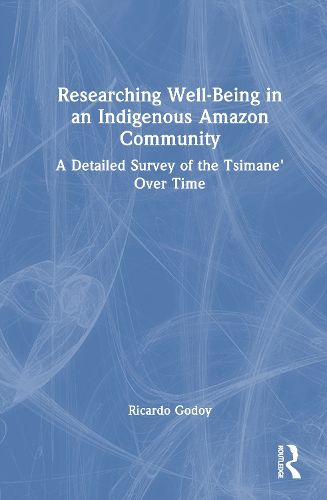Readings Newsletter
Become a Readings Member to make your shopping experience even easier.
Sign in or sign up for free!
You’re not far away from qualifying for FREE standard shipping within Australia
You’ve qualified for FREE standard shipping within Australia
The cart is loading…






This book aims to provide the first comprehensive, multi-year, systematic, empirical assessment in the behavioral sciences of how well-being changes over time in a rural society of Indigenous People in the Global South.
Using data compiled by the Tsimane' Amazonian Panel Study (2002-2010) which monitored change in Tsimane' communities, this book aims to analyse important social and economic outcomes in a farming and foraging society of native Amazonians in Bolivia. It uses multidisciplinary methods through real longitudinal research to bring together three themes: well-being, economic inequalities, and the fate of Indigenous People in small-scale rural societies of the Global South to ask the question 'Why is a society that faces material deprivations, considerable economic inequalities, and declining material standards of living so happy?'
This book aims to provide a comprehensive approach to the measurement of well-being and how to track its changes, providing a platform for future generations to gauge long-term change. It will resonate with undergraduate and graduate students across the behavioural sciences, professional anthropologists who specialise in the Amazon or well-being, development economists, and senior researchers who are part of the wave of emerging interest of doing research in small-scale rural societies of the Global South.
$9.00 standard shipping within Australia
FREE standard shipping within Australia for orders over $100.00
Express & International shipping calculated at checkout
This book aims to provide the first comprehensive, multi-year, systematic, empirical assessment in the behavioral sciences of how well-being changes over time in a rural society of Indigenous People in the Global South.
Using data compiled by the Tsimane' Amazonian Panel Study (2002-2010) which monitored change in Tsimane' communities, this book aims to analyse important social and economic outcomes in a farming and foraging society of native Amazonians in Bolivia. It uses multidisciplinary methods through real longitudinal research to bring together three themes: well-being, economic inequalities, and the fate of Indigenous People in small-scale rural societies of the Global South to ask the question 'Why is a society that faces material deprivations, considerable economic inequalities, and declining material standards of living so happy?'
This book aims to provide a comprehensive approach to the measurement of well-being and how to track its changes, providing a platform for future generations to gauge long-term change. It will resonate with undergraduate and graduate students across the behavioural sciences, professional anthropologists who specialise in the Amazon or well-being, development economists, and senior researchers who are part of the wave of emerging interest of doing research in small-scale rural societies of the Global South.